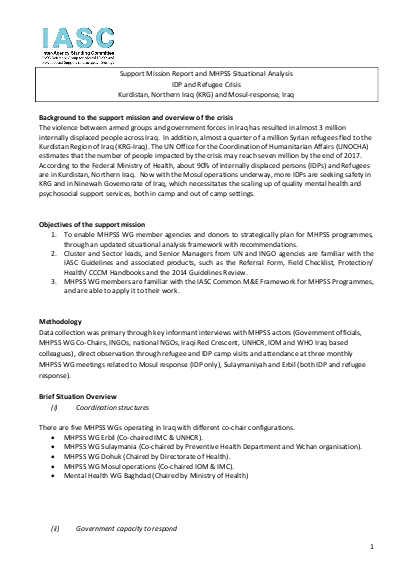
The violence between armed groups and government forces in Iraq has resulted in almost 3 million internally displaced people across Iraq. In addition, almost a quarter of a million Syrian refugees fled to the Kurdistan Region of Iraq (KRG-Iraq). The UN Office for the Coordination of Humanitarian Affairs (UNOCHA) estimates that the number of people impacted by the crisis may reach seven million by the end of 2017. According to the Federal Ministry of Health, about 90% of internally displaced persons (IDPs) and Refugees are in Kurdistan, Northern Iraq. Now with the Mosul operations underway, more IDPs are seeking safety in KRG and in Ninewah Governorate of Iraq, which necessitates the scaling up of quality mental health and psychosocial support services, both in camp and out of camp settings.
Objectives of the support mission:
- To enable MHPSS WG member agencies and donors to strategically plan for MHPSS programmes, through an updated situational analysis framework with recommendations.
- Cluster and Sector leads, and Senior Managers from UN and INGO agencies are familiar with the IASC Guidelines and associated products, such as the Referral Form, Field Checklist, Protection/ Health/ CCCM Handbooks and the 2014 Guidelines Review.
- MHPSS WG members are familiar with the IASC Common M&E Framework for MHPSS Programmes, and are able to apply it to their work.
Methodology:
Data collection was primary through key informant interviews with MHPSS actors (Government officials, MHPSS WG Co-Chairs, INGOs, national NGOs, Iraqi Red Crescent, UNHCR, IOM and WHO Iraq based colleagues), direct observation through refugee and IDP camp visits and attendance at three monthly MHPSS WG meetings related to Mosul response (IDP only), Sulaymaniyah and Erbil (both IDP and refugee response).
